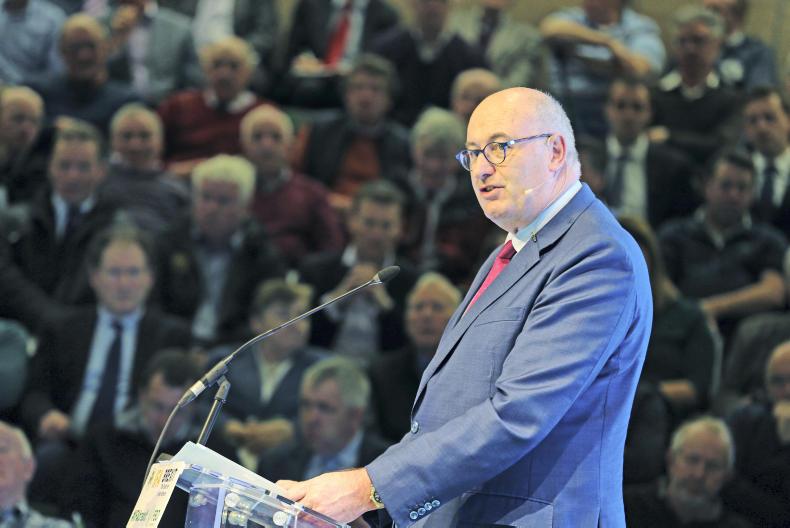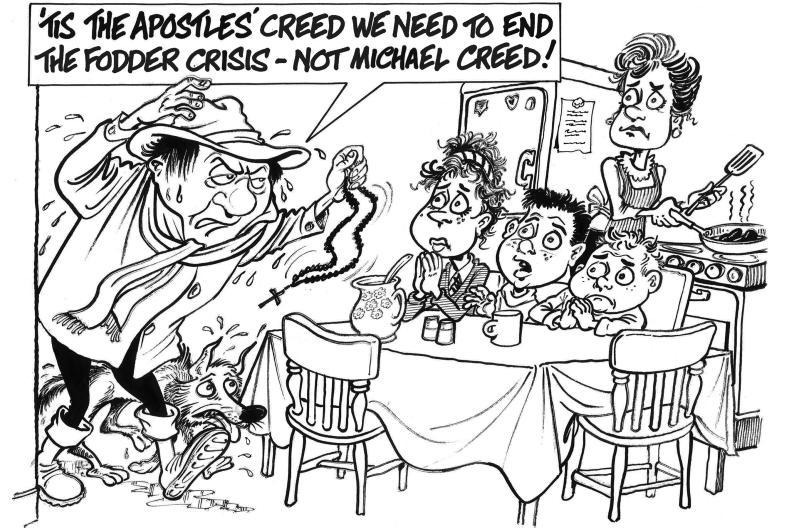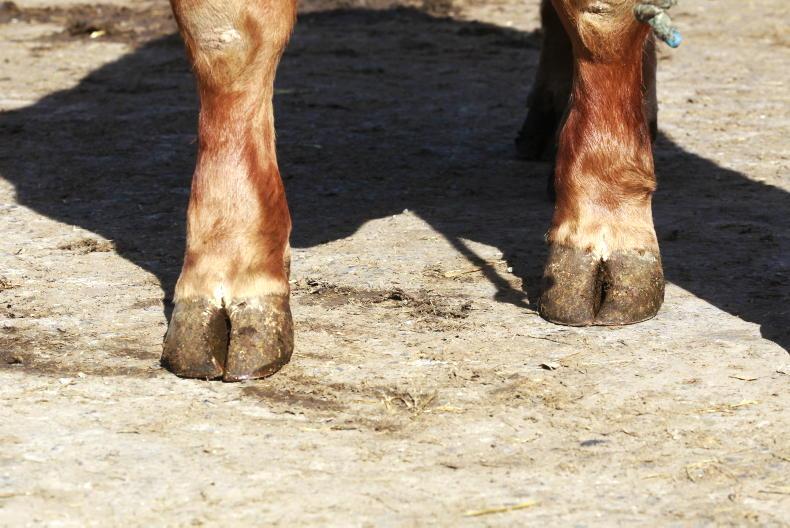While weather conditions may have improved over the past week, farmers remain under serious pressure. As we show on Grass+, growth rates have yet to pick up, remaining at around 25% of the 10-year seasonal average. The result is that despite approaching the middle of April, farmers across the country remain reliant on what are seriously depleted fodder supplies.
Poor growth rates and difficult ground conditions mean pressure will remain on the system even when conditions improve. There can be no let-up in the efforts we have seen in recent days to mobilise surplus fodder on Irish farms and to increase supplies through imports.
The IFA continues to call on Minister for Agriculture Michael Creed to introduce a meal voucher scheme that would help farmers reduce forage demand. These calls are falling on deaf ears unfortunately, despite the minister finally appearing to accept the severity of the problem at end of last week.
Thankfully we are seeing co-ops once again taking the lead, with Aurivo and Bandon joining Glanbia in offering rations at discounted prices. While there is a need for actual fodder on some farms, for most, stretching out existing supplies through increased concentrate feeding is a more economically viable option.
Regardless of how farmers are managing to work their way through the ongoing challenges, economic pressures are very real.
As we outline here, despite adequate fodder supplies, the need for increased meal feeding and straw – combined with the drop in animal performance – is costing €3,000 per week on our Tullamore Farm. On the Greenfield Farm in Kilkenny, the figure is closer to €7,000 per week with additional fodder having to be purchased for the 350-cow herd.
Banks clearly have a role to play in helping farmers in cashflow difficulty. Farmers will be relying on Minister Creed and the Government to use their influence to ensure that the necessary flexibility is shown by banks. The refusal by the minister to advance the rollout of the Government’s long-awaited low-interest agri-loan scheme has to be questioned given the financial pressure on farmers.
There is also scope for the Government to seek a derogation at EU level allowing for a reduction in the VAT charged on agriculture-related activities. Given the pressures on farmers to rebuild fodder supplies, the option of eliminating VAT on contractor charges for a period should be given serious consideration.
Meanwhile, some have used the fodder situation as an opportunity to question the sustainability of the growth in the national dairy herd. Here, Jack Kennedy asks if it is a case of being over-stocked or under-preforming? While there is no doubt that some farmers will have to re-assess their winter feed strategy, the reality is that nationally our stocking rate remains relatively low.
The challenge is to ensure that our grass swards are productive – but with 65% of Irish soils shown to be poor in fertility, there is clearly an issue in this regard.
Along with addressing productivity of grass swards, the role of the tillage sector needs consideration. There is an opportunity for tillage farmers to play a key role in producing fodder for livestock farms.
We have seen the contracting out of services work well in relation to rearing of replacement stock – why can the same principle not be applied to supplying fodder?
Tillage farmers will need some level of security in advance of planting. An agreement where livestock farmers pay for crop establishment with final payment post-harvest should be explored. There is a role for co-ops to act as an intermediary. There is a real opportunity to test the model this year – a maize crop would appear to tick both boxes in providing a later sowing option for tillage farmers and delivering a bulky good-quality forage option for livestock farmers looking to boost reserves.
EU: Hogan delivers but transparency still required

European Commissioner for Agriculture Phil Hogan. \ Finbarr O'RourkeEuropean Commissioner for Agriculture Phil Hogan has delivered on his promise to bring forward legislation on unfair trading practices for small and medium businesses in their dealings with large retailers and catering buyers.
Although the EU has looked at doing so in the past, it has always left it to member states to legislate in this area.
Now the European Commission has decided to bring forward a basic level of legislation that will outlaw slow payment to suppliers, late order cancellations, changing contracts or making suppliers pay for waste.
Other issues will require advance agreement, including the return of unsold produce, suppliers paying for promotions or securing shelf space.
These moves by the EU, while welcome, will benefit processor suppliers as there are virtually no examples of farmers trading directly with big end-user customers.
Farmers’ interest are concentrated on the next link in the chain, namely what the factory does with the raw material after it leaves the farm gate.
The legislation doesn’t address the transparency deficit beyond the farm gate. However, the Commission has indicated that this remains a work in progress and we can expect to see results on this later in the year.
Farmers will be looking to this to shine some light into the corporate world, particularly in the meat industry. Large multinational businesses in the sector in many cases don’t publish annual accounts, never mind explaining to farmer suppliers the level of margins in that part of the chain.
In this respect, an excellent model already exists for transparency in the processing part of the food chain. In the US, factories are obliged to provide the United States Department of Agriculture with an inventory of stocks and wholesale prices, which is then published online.
This gives farmers the information to judge if a market is depressed and stocks are high, or if it is buoyant with wholesale prices on the way up.
Commissioner Hogan has laid an excellent foundation by proposing unfair trading practices legislation which is likely to command the support of Parliament.
However, for farmers, the ultimate test will be the level of transparency he delivers in the processing sector. If he gets this right, he will have given excellent service to Irish and EU farmers.
Breeding: accurate data key to decision-making
Dairy and suckler farmers will this week receive a beef breeding guide produced by ICBF, Teagasc and the Irish Farmers Journal. The aim is to provide farmers with a complete manual when making beef breeding decisions this spring.
The guide contains a list of over 750 pedigree breeders participating in the Whole Herd Performance Recording programme (WHPR). These breeders are committed to providing commercial farmers with correct information by ensuring that data recording carried out in their herds is done accurately and transparently.
In the upcoming pedigree sales, animals from these herds will carry a WHPR stamp, giving farmers a level of confidence that the data used to formulate the indices is accurate. There is a clear long-term dividend for commercial farmers to support pedigree breeders that are committed to investing in providing accurate performance data.
Fair Deal Scheme: farmers still waiting on three-year cap
Minister of State for Mental Health and Older People Jim Daly was expected to bring proposals to Cabinet in February to limit charges on farm property under the Fair Deal nursing home support scheme. This has been delayed ever since, despite the identification of a three-year cap on these charges as the way forward.
The need for reform was clearly stated in a Government report in 2015 and in the Programme for Government in 2016. Many farming families depend on Fair Deal rules to be updated for important decisions on care for their elderly relatives and land transfers.
Urgent action is needed to pass legislation that can be implemented in the next budget.
While weather conditions may have improved over the past week, farmers remain under serious pressure. As we show on Grass+, growth rates have yet to pick up, remaining at around 25% of the 10-year seasonal average. The result is that despite approaching the middle of April, farmers across the country remain reliant on what are seriously depleted fodder supplies.
Poor growth rates and difficult ground conditions mean pressure will remain on the system even when conditions improve. There can be no let-up in the efforts we have seen in recent days to mobilise surplus fodder on Irish farms and to increase supplies through imports.
The IFA continues to call on Minister for Agriculture Michael Creed to introduce a meal voucher scheme that would help farmers reduce forage demand. These calls are falling on deaf ears unfortunately, despite the minister finally appearing to accept the severity of the problem at end of last week.
Thankfully we are seeing co-ops once again taking the lead, with Aurivo and Bandon joining Glanbia in offering rations at discounted prices. While there is a need for actual fodder on some farms, for most, stretching out existing supplies through increased concentrate feeding is a more economically viable option.
Regardless of how farmers are managing to work their way through the ongoing challenges, economic pressures are very real.
As we outline here, despite adequate fodder supplies, the need for increased meal feeding and straw – combined with the drop in animal performance – is costing €3,000 per week on our Tullamore Farm. On the Greenfield Farm in Kilkenny, the figure is closer to €7,000 per week with additional fodder having to be purchased for the 350-cow herd.
Banks clearly have a role to play in helping farmers in cashflow difficulty. Farmers will be relying on Minister Creed and the Government to use their influence to ensure that the necessary flexibility is shown by banks. The refusal by the minister to advance the rollout of the Government’s long-awaited low-interest agri-loan scheme has to be questioned given the financial pressure on farmers.
There is also scope for the Government to seek a derogation at EU level allowing for a reduction in the VAT charged on agriculture-related activities. Given the pressures on farmers to rebuild fodder supplies, the option of eliminating VAT on contractor charges for a period should be given serious consideration.
Meanwhile, some have used the fodder situation as an opportunity to question the sustainability of the growth in the national dairy herd. Here, Jack Kennedy asks if it is a case of being over-stocked or under-preforming? While there is no doubt that some farmers will have to re-assess their winter feed strategy, the reality is that nationally our stocking rate remains relatively low.
The challenge is to ensure that our grass swards are productive – but with 65% of Irish soils shown to be poor in fertility, there is clearly an issue in this regard.
Along with addressing productivity of grass swards, the role of the tillage sector needs consideration. There is an opportunity for tillage farmers to play a key role in producing fodder for livestock farms.
We have seen the contracting out of services work well in relation to rearing of replacement stock – why can the same principle not be applied to supplying fodder?
Tillage farmers will need some level of security in advance of planting. An agreement where livestock farmers pay for crop establishment with final payment post-harvest should be explored. There is a role for co-ops to act as an intermediary. There is a real opportunity to test the model this year – a maize crop would appear to tick both boxes in providing a later sowing option for tillage farmers and delivering a bulky good-quality forage option for livestock farmers looking to boost reserves.
EU: Hogan delivers but transparency still required

European Commissioner for Agriculture Phil Hogan. \ Finbarr O'RourkeEuropean Commissioner for Agriculture Phil Hogan has delivered on his promise to bring forward legislation on unfair trading practices for small and medium businesses in their dealings with large retailers and catering buyers.
Although the EU has looked at doing so in the past, it has always left it to member states to legislate in this area.
Now the European Commission has decided to bring forward a basic level of legislation that will outlaw slow payment to suppliers, late order cancellations, changing contracts or making suppliers pay for waste.
Other issues will require advance agreement, including the return of unsold produce, suppliers paying for promotions or securing shelf space.
These moves by the EU, while welcome, will benefit processor suppliers as there are virtually no examples of farmers trading directly with big end-user customers.
Farmers’ interest are concentrated on the next link in the chain, namely what the factory does with the raw material after it leaves the farm gate.
The legislation doesn’t address the transparency deficit beyond the farm gate. However, the Commission has indicated that this remains a work in progress and we can expect to see results on this later in the year.
Farmers will be looking to this to shine some light into the corporate world, particularly in the meat industry. Large multinational businesses in the sector in many cases don’t publish annual accounts, never mind explaining to farmer suppliers the level of margins in that part of the chain.
In this respect, an excellent model already exists for transparency in the processing part of the food chain. In the US, factories are obliged to provide the United States Department of Agriculture with an inventory of stocks and wholesale prices, which is then published online.
This gives farmers the information to judge if a market is depressed and stocks are high, or if it is buoyant with wholesale prices on the way up.
Commissioner Hogan has laid an excellent foundation by proposing unfair trading practices legislation which is likely to command the support of Parliament.
However, for farmers, the ultimate test will be the level of transparency he delivers in the processing sector. If he gets this right, he will have given excellent service to Irish and EU farmers.
Breeding: accurate data key to decision-making
Dairy and suckler farmers will this week receive a beef breeding guide produced by ICBF, Teagasc and the Irish Farmers Journal. The aim is to provide farmers with a complete manual when making beef breeding decisions this spring.
The guide contains a list of over 750 pedigree breeders participating in the Whole Herd Performance Recording programme (WHPR). These breeders are committed to providing commercial farmers with correct information by ensuring that data recording carried out in their herds is done accurately and transparently.
In the upcoming pedigree sales, animals from these herds will carry a WHPR stamp, giving farmers a level of confidence that the data used to formulate the indices is accurate. There is a clear long-term dividend for commercial farmers to support pedigree breeders that are committed to investing in providing accurate performance data.
Fair Deal Scheme: farmers still waiting on three-year cap
Minister of State for Mental Health and Older People Jim Daly was expected to bring proposals to Cabinet in February to limit charges on farm property under the Fair Deal nursing home support scheme. This has been delayed ever since, despite the identification of a three-year cap on these charges as the way forward.
The need for reform was clearly stated in a Government report in 2015 and in the Programme for Government in 2016. Many farming families depend on Fair Deal rules to be updated for important decisions on care for their elderly relatives and land transfers.
Urgent action is needed to pass legislation that can be implemented in the next budget.












SHARING OPTIONS